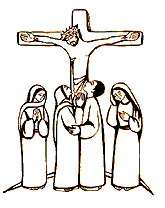sharing in Christ's suffering
The preaching at church Sunday was on suffering. It encouraged Christians to suffer patiently, which I liked, but there was the usual confusion between natural suffering (like illness, accidents, etc) and persecution. For example, to offer comfort, it was said that bearing with an illness is sharing in Christ's sufferings, and passages like this one were used to support this idea:
Blessed be the God and Father of our Lord Jesus Christ, the Father of mercies and God of all comfort, who comforts us in all our affliction, so that we may be able to comfort those who are in any affliction, with the comfort with which we ourselves are comforted by God. For as we share abundantly in Christ's sufferings, so through Christ we share abundantly in comfort too. (2 Cor 1.3-5)
It's a powerful passage, and comforting. But it's not about illness. It's about the sufferings that the apostles were going through because of their faith, because of the forceful resistance to their way of life and their preaching. A few verses later, Paul writes:
For we do not want you to be ignorant, brethren, of the affliction we experienced in Asia; for we were so utterly, unbearably crushed that we despaired of life itself. Why, we felt that we had received the sentence of death; but that was to make us rely not on ourselves but on God who raises the dead; he delivered us from so deadly a peril, and he will deliver us; on him we have set our hope that he will deliver us again. (2 Cor 1.8-10)And this experience was not just for the apostles, but also for the rest of the early church. Paul tells the Corinthians to expect "the same sufferings that we suffer":
If we are afflicted, it is for your comfort and salvation; and if we are comforted, it is for your comfort, which you experience when you patiently endure the same sufferings that we suffer. Our hope for you is unshaken; for we know that as you share in our sufferings, you will also share in our comfort. (2 Cor 1.6-7)This is comfort for those who suffer as the apostles suffered, who suffered as Jesus suffered, because they followed his example and lived in his spirit. This is what we are called to as Christians.
The promises and comforts of Christianity are not just meant to help us get through the natural troubles of life. They are a call to an extreme life. A life where we will be attacked and taken advantage of for our generosity and forgiveness, but where we will also experience extreme comfort and deliverance by God.
 And this is something worth striving for. We don't seek illness or accidents. But we should seek to "lose your life for my sake," as Jesus taught (Mt 10.39). Paul put it in these words:
And this is something worth striving for. We don't seek illness or accidents. But we should seek to "lose your life for my sake," as Jesus taught (Mt 10.39). Paul put it in these words:For his sake I have suffered the loss of all things, and count them as refuse, in order that I may gain Christ and be found in him... that I may know him and the power of his resurrection, and may share his sufferings, becoming like him in his death, that if possible I may attain the resurrection from the dead. (Phil 3.8-10)
What does this look like in daily life? A few tense situations from the past week come to mind:
-After sending a couple to their new home with many things that they would need, they borrowed an expensive item and have not returned it. I've been trying to keep in mind Jesus' words, "Give to every one who begs from you; and of him who takes away your goods do not ask them again." (Lk 6.30) But others here are starting to demand that I do something to get it back."To make us rely not on ourselves but on God..."
-There was a loud disagreement in our front yard during soup kitchen and the neighbor called the police (the argument was over before the police arrived). We explained that we try to solve disputes through listening, patience and our personal relationships with the guests here, rather than resorting to the physical force of the police. But they said if we weren't going to start calling the police, they would file an offical complaint against us.
-Willy, who was in a fight here and now has his neck in a brace, is still threatening to sue and demanding money. He is hard to deal with and will not listen when we try to explain that his own drunkenness and belligerence led to his injury. So we just listen and give him food when he is hungry, blankets, bus tokens, etc.


 subscribe
subscribe